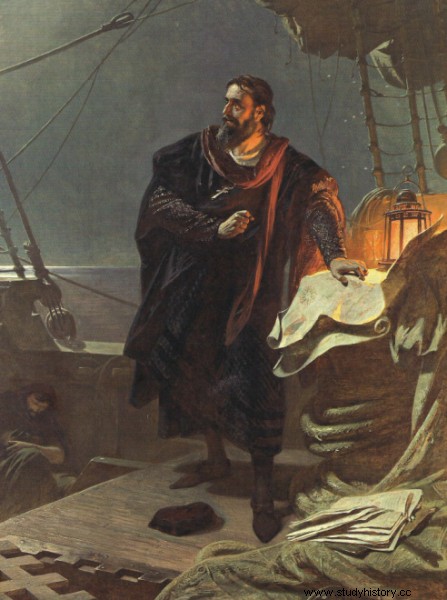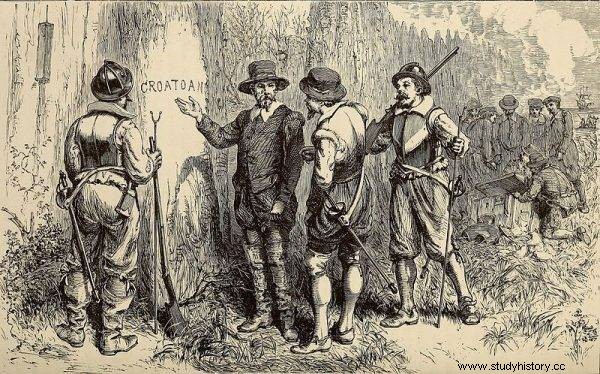In the history of "the greatest country in the world" (as the US citizens themselves call it) there are plenty of dark pages. Trafficking in human beings and slavery practiced since the time of Columbus, bloody crimes and acts of cannibalism - this is probably what Americans would prefer to forget ...
Slavery in the United States is associated primarily with black forced laborers of giant cotton, tobacco or indigo plantations. However, this shameful practice on the American continent began much earlier, in the times of ... Christopher Columbus.
This tireless explorer of America has been a sailor on Portuguese slave ships since 1482. It is therefore not surprising that a decade later he informed his patrons - Ferdinand of Aragon and Isabella of Castile - that, as reported in the book We, the nation Jill Lepore:"It would take a while to enslave the people of Haiti because" with fifty people you can keep them all in check and you can make them do whatever you want ".
In the decades that followed, the Spaniards made local slaves work beyond their strength in gold mines and plantations, bringing them deadly germs that quickly decimated them. They were soon forced to turn to another source of free labor - Africans, sold by the Portuguese. It is estimated that between 1500 and 1800, about 2.5 million Europeans moved to the Americas altogether, forcibly taking 12 million people from Africa with them.

Christopher Columbus was a seaman on Portuguese slave ships before discovering America.
By the way, they killed 50 million Native Americans - mainly due to diseases from the Old Continent, unknown overseas, such as ... smallpox. However, according to the decision-makers of the time, death belonged to the Indians. After all, they were "barbarians" ...
Wife thrown to eat
The barbarism of the Indians was evidenced by their breaking the laws of nature. Well, as European settlers eagerly repeated, the indigenous peoples of the New World allegedly devoted themselves to cannibalistic practices. In fact, these were only slander that was meant to justify waging war against them.
Acts of cannibalism, on the other hand, happened among newcomers from overseas. The events took such a drastic turn, among others in Virginia, where a group of Englishmen (without a single woman) arrived in the spring of 1607 to found a colony. As he describes in the book We, the nation Jill Lepore:
The colonists proved unable to rule. They built a fort and began searching for gold. However, a group of soldiers and lord-adventurers did not want to clear fields or plant and harvest crops. Instead, they stole food Powhatan's people, they raided the grain and bean lockers.
It didn't bode well for the colony's future. John Smith, elected governor, a veteran of the wars with the Spaniards in France and the Netherlands, bitterly concluded that he had been sent the most useless people to populate Virginia. He counted only one carpenter and two blacksmiths in the entire group. On the other hand, there were traders, soldiers and lords who were fit for "spoiling the Republic of Poland than for its creation".

The text is based on the book by Jill Lepore “We, naród. The New History of the United States ”, which has just been released by Wydawnictwo Poznańskie.
In order to slightly motivate the colonists to work, in 1608 Smith introduced the principle:"He who does not work, he does not eat." However, it did not achieve the expected results. On the contrary, the following year, the settlers revolted and sent him back to England, explaining that he had made Virginia "a wasteland, ruin, death and hell." Even in their worst nightmares, they never thought hell was yet to come.
In winter, at the turn of 1609 and 1610, it turned out that neglecting the cultivation of land and hunting, and making your neighbors your enemies can have tragic consequences. During the few frosty months, the number of the colony's inhabitants shrank from over 500 to several dozen. Vice Governor George Percy wrote:
Due to hunger, many ran naked from their beds, so thin they looked like skeletons, shouting:We're hungry! We're hungry! (...) One of ours, Colline, murdered his wife, snatched the child from her womb and threw it into the river, then cut the mother into pieces and salted it for food.
Vanishing Settlement
An even more tragic end happened to the expedition sent in 1587 to what is now North Carolina. It was the second attempt to settle the area - and create the first English settlement in America. It was led by the artist and cartographer John White, who had been elected governor of the Roanoke colony.
He also took part in an earlier expedition led by Walter Relaigh. Relaigh on the island of Outer Banks with a hundred people built a fort followed by residential houses. Initially, the settlers sent enthusiastic reports to England about the land of milk and honey. The reality turned out to be cruel. When the transport of food from overseas was delayed, the colonists began to starve. In desperation, they finally took Sir Francis Drake's ship back to their homeland. Before that, however, they had made enemies among the natives.

Only the letters CRO carved in wood remained after the colonists, developed as CROATOAN.
The second approach to the settlement of America by the English was, therefore, in principle doomed to failure. With supplies failed again, Smith abandoned the colony and sailed back to his homeland in hopes of gaining backup. The problem was that the Spaniards had just started their invasion, so Smith was unable to procure ships for the Roanoke cruise. The estate was abandoned at the mercy of fate. As he describes in the book We, the nation Jill Lepore:
All information about the English colony at Roanoke ... was lost. When White finally returned in 1590, he found neither an Englishman, nor his daughter, or granddaughter - a baby named Virginia, in honor of Elizabeth, the virgin queen.
Almost all that remained of the estate were the letters CRO carved into the tree trunk. This sign was agreed with the colonists of White; it meant that the settlers packed their belongings and headed inland in search of a better place. Three letters, that's it. All hearing of them has been lost.
To this day, it has not been possible to clearly establish what really happened in the fort during the governor's absence. But rather nothing good.
Source:
The text is based on the book by Jill Lepore We, the nation. The New History of the United States , which has just been released by Wydawnictwo Poznańskie.
